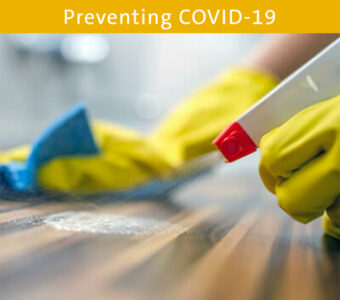Most people who get COVID-19 only have mild symptoms and don’t require hospitalization. But that doesn’t mean you can’t spread the disease to others.
If you’ve been tested and confirmed to have COVID-19 or are asked to self-isolate because it’s assumed you do, there are some important steps to take to help you recover and keep your loved ones healthy.
Stay home except to get medical care
If you’re sick and your symptoms are mild, stay home! Leaving your home risks exposing others to the virus. Ask a friend, family member or neighbor to run vital errands for you, like picking up groceries and prescriptions. Have them do a no-contact delivery by leaving items outside your door.
Call your doctor to discuss your symptoms and any concerns. Your doctor will be able to give you instructions for at-home treatment, and will direct you to testing or inpatient treatment if they believe it’s necessary. If you begin to have trouble breathing, develop persistent chest pain, become confused or your lips or face turn blue, call 911.
Adhere to social distancing
If you’re sick with COVID-19, you need to separate yourself from others living in your home. Designate a sick room in your house where you will spend the majority of your time, and use a separate bathroom, if available. If you need to share a bathroom, disinfect all surfaces after use.
If possible, have someone else in your home prepare your meals and leave them outside your door.
When you do need to be around people, wear a mask and stay at least 6 feet away from others.
Avoid sharing personal items
Don’t share any household items like bedding, towels, dishes and water bottles. Everything should be washed thoroughly with soap and water after use.
Clean high-touch surfaces frequently
The new coronavirus can live on hard surfaces for up to 72 hours. You should clean surfaces in your sick room and designated bathroom every day. Let another person in your household clean surfaces in other areas.
High-touch surfaces include things like doorknobs, phones, light switches, remote controls, countertops and bathroom fixtures.
Be sure to reference our tips for disinfecting your home.
Stay away from pets
While it might be hard to resist seeking comfort from your furry family members, it’s important to avoid contact with pets because they may carry the virus to others. If possible, ask another member of the household take care of your pets while you’re sick. If you do need to take care of them, wear a mask and wash your hands before and after interacting with them.
Rest up and stay hydrated
As with any illness, it’s always important to rest and stay hydrated. Some over-the-counter medications may also help temporarily relieve symptoms. Ask your doctor what kind of medication they recommend.
Practice sick etiquette
Home isolation doesn’t give you an excuse to be gross. Always cover your cough or sneeze into a tissue and wash your hands often.
Know when it’s ok to end isolation
You can return to regular activities when you meet all of the following conditions:
- No fever for at least 72 hours without using fever-reducing medication.
- Other symptoms have improved (for example, cough and shortness of breath)
- At least seven days have passed since your symptoms first appeared.






